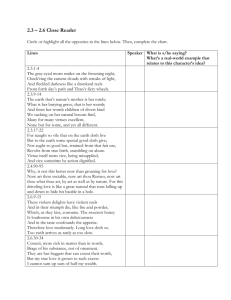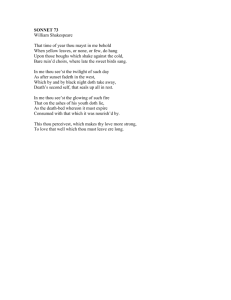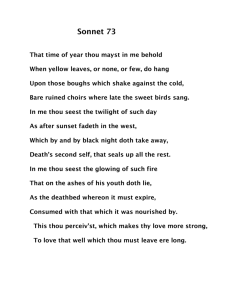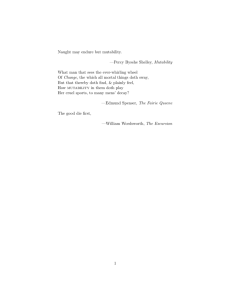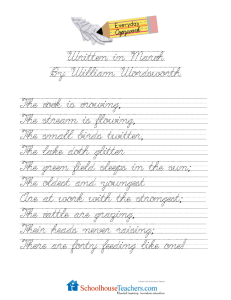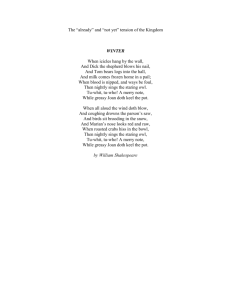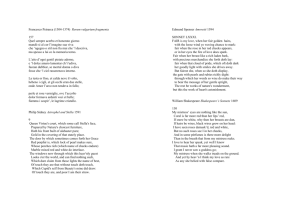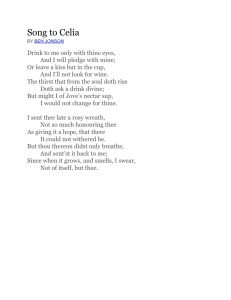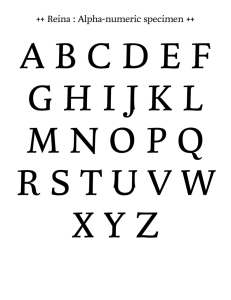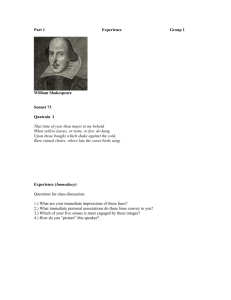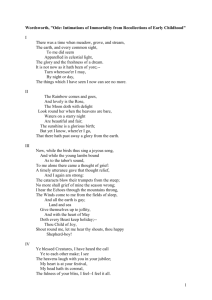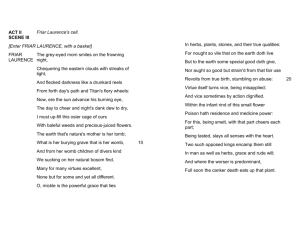Strickland/English 110:
advertisement
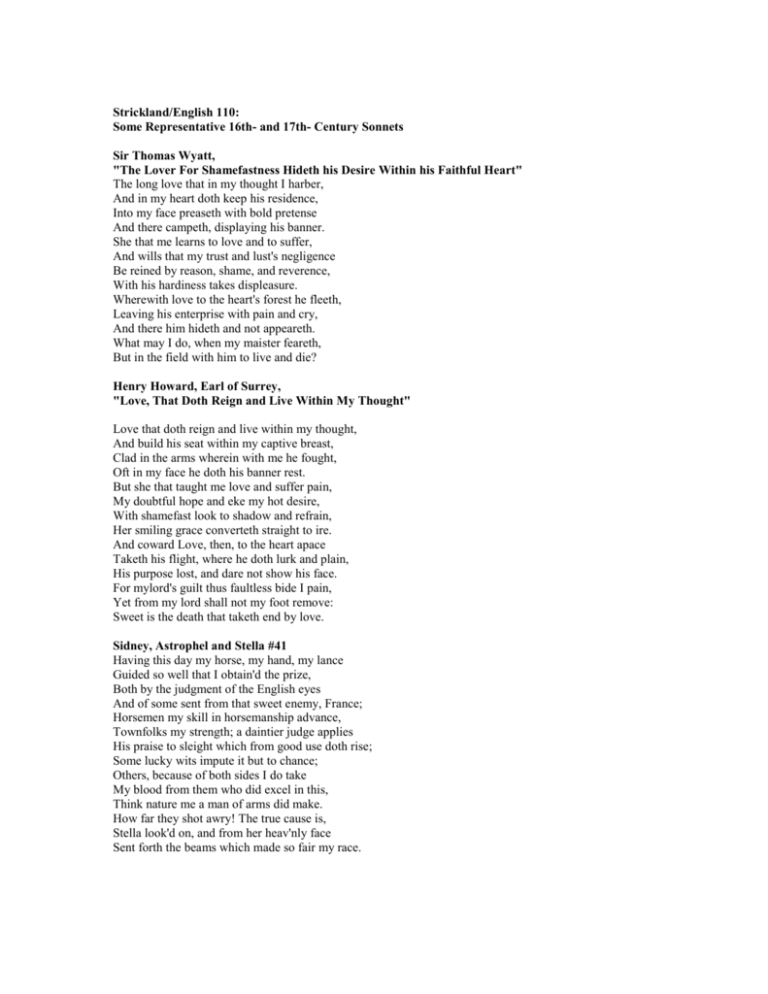
Strickland/English 110: Some Representative 16th- and 17th- Century Sonnets Sir Thomas Wyatt, "The Lover For Shamefastness Hideth his Desire Within his Faithful Heart" The long love that in my thought I harber, And in my heart doth keep his residence, Into my face preaseth with bold pretense And there campeth, displaying his banner. She that me learns to love and to suffer, And wills that my trust and lust's negligence Be reined by reason, shame, and reverence, With his hardiness takes displeasure. Wherewith love to the heart's forest he fleeth, Leaving his enterprise with pain and cry, And there him hideth and not appeareth. What may I do, when my maister feareth, But in the field with him to live and die? Henry Howard, Earl of Surrey, "Love, That Doth Reign and Live Within My Thought" Love that doth reign and live within my thought, And build his seat within my captive breast, Clad in the arms wherein with me he fought, Oft in my face he doth his banner rest. But she that taught me love and suffer pain, My doubtful hope and eke my hot desire, With shamefast look to shadow and refrain, Her smiling grace converteth straight to ire. And coward Love, then, to the heart apace Taketh his flight, where he doth lurk and plain, His purpose lost, and dare not show his face. For mylord's guilt thus faultless bide I pain, Yet from my lord shall not my foot remove: Sweet is the death that taketh end by love. Sidney, Astrophel and Stella #41 Having this day my horse, my hand, my lance Guided so well that I obtain'd the prize, Both by the judgment of the English eyes And of some sent from that sweet enemy, France; Horsemen my skill in horsemanship advance, Townfolks my strength; a daintier judge applies His praise to sleight which from good use doth rise; Some lucky wits impute it but to chance; Others, because of both sides I do take My blood from them who did excel in this, Think nature me a man of arms did make. How far they shot awry! The true cause is, Stella look'd on, and from her heav'nly face Sent forth the beams which made so fair my race. John Donne, Holy Sonnet #14 Batter my heart, three-personed God; for you As yet but knock, breathe, shine, and seek to mend; That I may rise, and stand, o'erthow me, and bend Your force, to break, blow, burn, and make me new. I, like an usurped town to another due, Labour to admit you, but oh, to no end, Reason, your viceroy in me, me should defend, But is captived, and proves weak or untrue, Yet dearly I love you, and would be loved fain, But am betrothed unto your enemy, Divorce me, untie, or break that knot again, Take me to you, imprison me, for I Except you enthral me, never shall be free, Nor ever chaste, except you ravish me. Edmund Spenser, Amoretti #15 Ye tradefull Merchants, that with weary toyle Do seeke most pretious things to make your gain, And both the Indias of their treasures spoile, What needeth you to seeke so farre in vaine? For loe my loue doth in her selfe containe All this worlds riches that may farre be found; If Saphyres, loe her eies be Saphyres plaine; If Rubies, loe hir lips be Rubies sound; If Pearles, hir teeth be pearles both pure and round; If Yuorie, her forhead yuory weene; If Gold, her locks are finest gold on ground; If siluer, her faire hands are siluer sheene. But that which fairest is but few behold, Her mind adornd with vertues manifold. Edmund Spenser, Amoretti #75 One day I wrote her name upon the strand, But came the waves and washed it away: Agayne I wrote it with a second hand, But came the tyde, and made my paynes his pray. "Vayne man," sayd she, "that doest in vaine assay, A mortall thing so to immortalize, For I my selve shall lyke to this decay, And eek my name bee wyped out lykewize." "Not so," quod I, "let baser things devize To dy in dust, but you shall live by fame: My verse your vertues rare shall eternize, And in the hevens wryte your glorious name. Where whenas death shall all the world subdew, Our love shall live, and later life renew." William Shakespeare, Sonnet #130 My mistress' eyes are nothing like the sun; Coral is far more red than her lips red; If snow be white, why then her breasts are dun; If hairs be wires, black wires grow on her head. I have seen roses damask'd, red and white, But no such roses see I in her cheeks; And in some perfumes is there more delight Than in the breath that from my mistress reeks. I love to hear her speak; yet well I know That music hath a far more pleasing sound. I grant I never saw a goddess go: My mistress, when she walks, treads on the ground; And yet, by heaven, I think my love as rare As any she belied with false compare. William Shakespeare, Sonnet #18 Shall I compare thee to a summer's day? Thou art more lovely and more temperate: Rough winds do shake the darling buds of May, And summer's lease hath all too short a date: Sometimes too hot the eye of heaven shines, And often is his gold complexion dimmed; And every fair from fair sometimes declines, By chance or nature's changing course untrimmed; But thy eternal summer shall not fade Nor lose possession of that fair thou ow'st; Nor shall Death brag thou wander'st in his shade, When in eternal lines to time thou grow'st: So long as men can breathe, or eyes can see, So long lives this, and this gives life to thee. Lady Mary Wroth, from The Countess of Montgomery's Urania, Pamphilius to Amphilanthus, #14 Am I thus conquer'd? haue I lost the powers, That to withstand which ioyes to ruine me? Most I bee still, while it my strength deuoures, And captiue leads me prisoner bound, vnfree? Loue first shall leane mens fant'sies to them free, Desire shall quench loues flames, Spring, hate sweet showres; Loue shall loose all his Darts, haue sight, and see His shame and wishings, hinder happy houres. Why should we not Loues prblinde charmes resist? Must we be seruile, doing what he list? No, seeke some host to harbour thee: I flye Thy Babish tricks, and freedome doe professe; But O, my hurt makes my lost heart confesse: I loue, and must; so farewell liberty.
